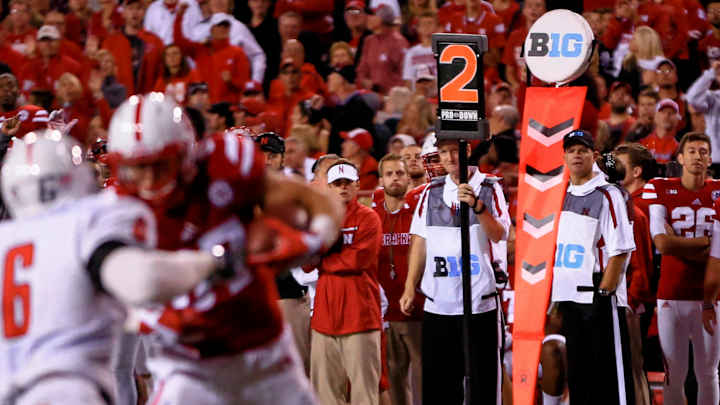Anonymity is goal for guys working on football chain gangs

LINCOLN, Neb. (AP) They are there every football game, those men in caps and vests moving in unison on the sideline following every play. The sideline crew ''chain gang'' plays a vital role marking the line of scrimmage and distance for a first down and keeping track of the downs.
They happily exist in the background, unless they mess up.
Chain gangs found unwanted spotlight in two major-college games last week. In the Big Ten, Illinois was forced to turn over the ball to Nebraska after a third down because the sideline crew and officials thought it was fourth down. Even a video review failed to correct the mistake. In the Big 12, the incorrect placement of the first-down marker after a penalty resulted in Oklahoma State being wrongly awarded a first down.
Illinois got the ball right back on an interception and ended up winning 14-13 at home. Kansas State, however, was adversely affected because the phantom first down kept alive a touchdown drive in Oklahoma State's 36-34 win in Stillwater, Oklahoma. The Big Ten and Big 12 both issued statements acknowledging the errors.
Both incidents occurred on the weekend of the 25th anniversary of perhaps the most notorious chain-gang gaffe of all time, the ''Fifth Down Game'' in Columbia, Missouri. Colorado beat Missouri on a fifth-down play as time ran out and went on to win a share of the national championship.
Schools are responsible for hiring the sideline crew for their home games. At Nebraska, for example, the chain gang is made up of current or former high school football officials. Training is on the job, and each man earns about $50 a game.
''It's not rocket science to stand there and hold a pole,'' said Greg Maschman, who heads the crew at Nebraska home games, ''but we do take it pretty seriously.''
Illinois coach Bill Cubit said the jobs of sideline crews and on-field officials have become more difficult because of the increasing speed of the game. Kansas State coach Bill Snyder offered no solution for the problem he encountered last Saturday but said, ''Maybe we need a better system than what we have. I'd like to labor under the assumption that those things will be taken care of by other people.''
College crews have five members positioned on the sideline opposite the press box, and they're under the supervision of the linesman.
There are two ''rod men,'' one who holds the pole marking the spot where the current set of downs began and the other who holds the pole marking the line to gain for a first down. The ''box man'' sets a pole at the current line of scrimmage, and he also flips the down number located in the box at the top of his pole. The ''clip man'' attaches a clip to a link in the chain at the nearest 5-yard line, ensuring accuracy if the chains are taken onto the field to measure for a first down. The fifth man records penalties.
A two-man auxiliary crew works the opposite sideline so players, coaches and officials on that side can see the distance needed for a first down.
The linesman's first instruction to the chain gang members is to stay safe, meaning to drop their poles and flee if a play is coming their way.
As a box man, Maschman checks and re-checks to make sure he and the linesman agree on the down. Maschman wears a down indicator on his hand, an elastic band that slips over one, two, three or four fingers depending on the down. Also, after each play Maschman writes the down and yard-line on a strip of athletic tape he sticks on the back of the box at the top of his pole.
''I try to concentrate and do my job, and I probably take it more serious than I would need to,'' he said. ''I say that, and then something that happens at Illinois happens, and you're damn glad you do take it seriously so it never happens to us.''
---
David Mercer and Luke Meredith contributed.
---
This version corrects to Illinois winning at home in 4th paragraph.
